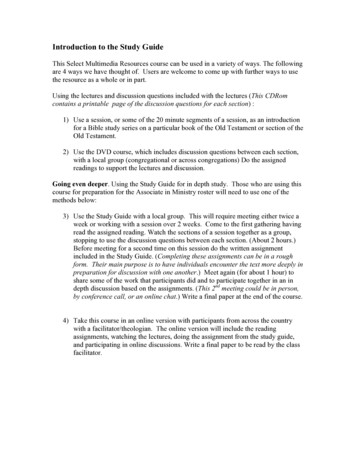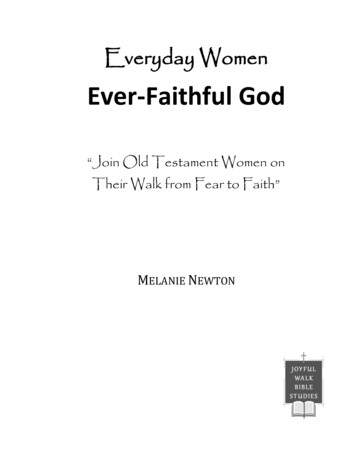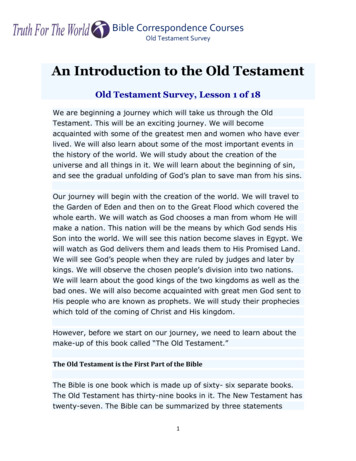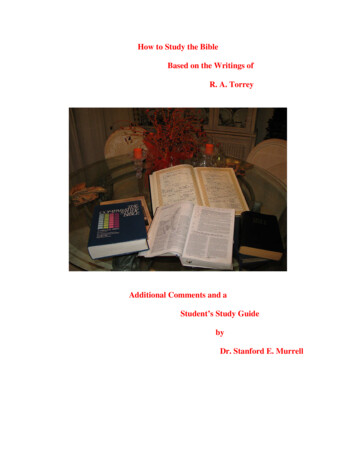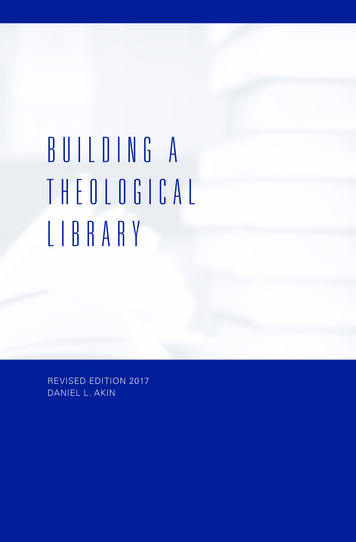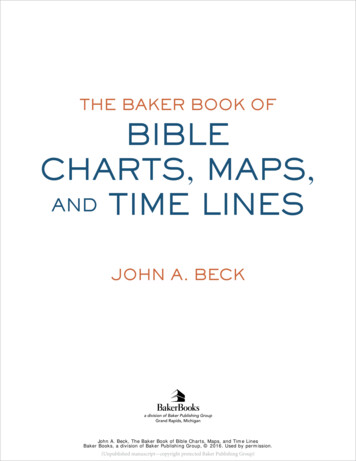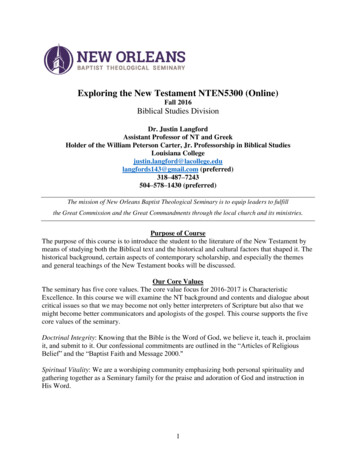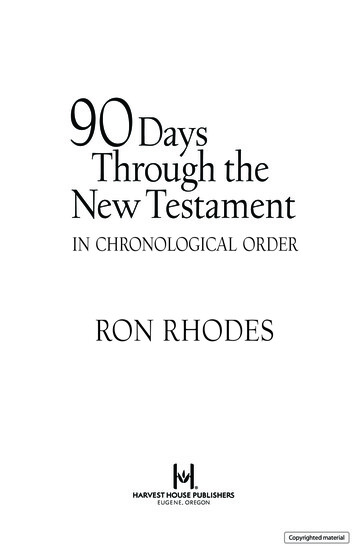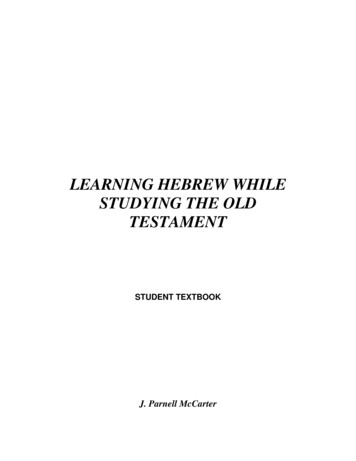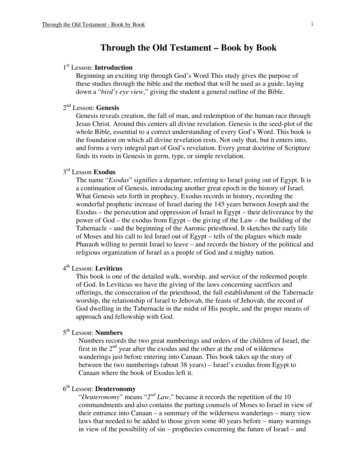
Transcription
Through the Old Testament - Book by Book1Through the Old Testament – Book by Book1st Lesson: IntroductionBeginning an exciting trip through God’s Word This study gives the purpose ofthese studies through the bible and the method that will be used as a guide, layingdown a “bird’s eye view,” giving the student a general outline of the Bible.2nd Lesson: GenesisGenesis reveals creation, the fall of man, and redemption of the human race throughJesus Christ. Around this centers all divine revelation. Genesis is the seed-plot of thewhole Bible, essential to a correct understanding of every God’s Word. This book isthe foundation on which all divine revelation rests. Not only that, but it enters into,and forms a very integral part of God’s revelation. Every great doctrine of Scripturefinds its roots in Genesis in germ, type, or simple revelation.3rd Lesson ExodusThe name “Exodus” signifies a departure, referring to Israel going out of Egypt. It isa continuation of Genesis, introducing another great epoch in the history of Israel.What Genesis sets forth in prophecy, Exodus records in history, recording thewonderful prophetic increase of Israel during the 145 years between Joseph and theExodus – the persecution and oppression of Israel in Egypt – their deliverance by thepower of God – the exodus from Egypt – the giving of the Law – the building of theTabernacle – and the beginning of the Aaronic priesthood. It sketches the early lifeof Moses and his call to led Israel out of Egypt – tells of the plagues which madePharaoh willing to permit Israel to leave – and records the history of the political andreligious organization of Israel as a people of God and a mighty nation.4th Lesson: LeviticusThis book is one of the detailed walk, worship, and service of the redeemed peopleof God. In Leviticus we have the giving of the laws concerning sacrifices andofferings, the consecration of the priesthood, the full establishment of the Tabernacleworship, the relationship of Israel to Jehovah, the feasts of Jehovah, the record ofGod dwelling in the Tabernacle in the midst of His people, and the proper means ofapproach and fellowship with God.5th Lesson: NumbersNumbers records the two great numberings and orders of the children of Israel, thefirst in the 2nd year after the exodus and the other at the end of wildernesswanderings just before entering into Canaan. This book takes up the story ofbetween the two numberings (about 38 years) – Israel’s exodus from Egypt toCanaan where the book of Exodus left it.6th Lesson: Deuteronomy“Deuteronomy” means “2nd Law,” because it records the repetition of the 10commandments and also contains the parting counsels of Moses to Israel in view oftheir entrance into Canaan – a summary of the wilderness wanderings – many viewlaws that needed to be added to those given some 40 years before – many warningsin view of the possibility of sin – prophecies concerning the future of Israel – and
Through the Old Testament - Book by Book2the Palestinian covenant.7th Lesson: JoshuaThis book deals with the consummation of the redemption of Israel out of Egypt,showing that redemption has two parts – out and into. It records the fulfillment ofthe prophecies of Abraham, Isaac, Jacob, and Moses regarding the land of promisebeing given to Israel; and the conquest and division of this land. The first 12chapters give the conquest; chapters 13 through 24 giving the division of the land8th Lesson: JudgesJudges is a record of Israel’s failure during the rule of the judges, recording theapostasies, servitudes, the various judges and their exploits. This book covers about440 years of the judges rule in Israel.9th Lesson: RuthRuth is a simple historical record of life in Israel, during the judges, illustrating thelaw of kinsman redemption, recording the story of a Gentile woman in thegenealogy of Jesus Christ, and bringing the genealogy of David up to day – fromPharez to David.10th Lesson: 1 Samuel1st Samuel presents the life history of Samuel, the last of the days of the judges, themoral failure of the priesthood under Eli, the moral failure of the judges underSamuel, the beginning and failure of the monarchy under Saul, the anointing andtrying experiences of Davie, and the end of ?Saul.11th Lesson: 2 Samuel2nd Samuel records the restoration of order in Israel through David, the choice ofGod as ruler of his people, the full establishment of the kingdom of Israel withJerusalem as the political and religious center, the making of the Davidic covenantas the basis of all earthly kingdom truth, the full conquest of the enemies of Israel,David’s in and repentance, family troubles of David, rebellion of Absalom, and thelast days of David.12th Lesson: 1 KingsPresents the history of the kings of Israel and Judah from the time of Solomon tothe captivity by Babylon, showing the reason for the Davidic kingdom not beingperpetually continued and to reveal why God sent Israel into captivity13th Lesson: 2 KingsRepeating the history of the kings of Israel and Judah from the time of Solomon tothe captivity to Babylon, giving additional particulars, showing the reason why Godsent Israel into captivity.14th Lesson: 1 ChroniclesGiving genealogical background of Israelite leaders and of the coming messiah, anda history of the kingdom of Judah and of the ancestors of Jesus Christ, according tothe flesh.
Through the Old Testament - Book by Book315th Lesson: 2 ChroniclesGiving additional genealogical background of Israelite leaders of the comingmessiah, and a history of the kingdom of Judah and of the ancestors of Jesus Christ,according to His earthly humanity.16th Lesson: EzraTells of the return of the Jews from all the 13 tribes of Israel, the rebuilding of theTemple, and the difficulties that faced the nation in respect to separation from theheathen world living around Palestine.17th Lesson: NehemiahContains the history of Nehemiah in Babylon and his a record of his events duringhis 12 years of governorship in Judea; events in the charge of Ezra; lists of Jewishexiles who came back to Jerusalem; a record of the dedication of the walls andcertain reforms made by Nehemiah in his 2nd governorship of Judea.18th Lesson: EstherGives the great deliverance of the Jews from extermination during the time of theBabylonian captivity – recording the beautiful story of Esther and the institution ofthe feast of Purim.19th Lesson: JobGives a treatise on human sufferings and the effects upon the sufferer and hisfriends, and reasoning about why these things happen even to the godly of the earth,showing the part Satan and God have to do with human suffering.20th lesson: PsalmsPresenting Christ; God; the Word of God; creations; sufferings and redemption ofGod’s people21st Lesson: ProverbsPresenting practical moral and spiritual truth in proverbial form – showing the wayto knowledge and wisdom.22nd Lesson: EcclesiastesPresents a record of Solomon’s reasoning “under the sun” while he in a backsliddencondition.23rd Lesson: Song of SolomonPresents a literal story of the song concerning Solomon while he was visiting in thenorthern part of his kingdom. At Shunem he found a shepherdess wit whose beautyand charm he was so captivated that he took her to Jerusalem, hoping to win her forhis queen of queens. Having already been promised to a shepherd of her owncommunity, she proved herself faithful to his love; she was finally married to himwith the sanction of the king and her own family.24th Lesson: IsaiahIsaiah is a miniature of the Bible, - 66 books; the first 39 chapters dealing with Lawand judgment corresponding with the message of the 39 books of the Old
Through the Old Testament - Book by Book4Testament, (revealing the coming judgment upon Israel and captivity because of sinand apostasy, and doming judgment on many Gentile nations); then 27 chapters,corresponding with the 27 books of the New Testament both in number andmessage of mercy, comfort, and eternal restoration under the coming Messiah.25th lesson: JeremiahJeremiah writes of the dangers of backsliding. His theme is one of judgmentwithout mercy for those who become apostates and defy God. He repeatedly refersto the Babylonian captivity, the return of Israel after 70 years, another world-widedispersion, a final regathering of Israel at the end of this age, and the reign ofMessiah over Israel forever.26th Lesson: LamentationsPresenting 5 poems of lamentation expressing the deep suffering of Jeremiahbecause Israel and Jerusalem were destroyed.27th Lesson: EzekielEzekiel, commissioned of God, rebukes Israel for her many sins, for her constantand ever deepening hardness against Him. The Holy Spirit inspires Ezekiel to givevarious pantomimes of Scripture. His prophecies are of 4 general kinds: (1) theimmediate captivity of Israel and the destruction of Jerusalem; (2) judgments onother nations for their part in the sins and rebellions of Israel; (3) propheciesconcerning Israel in the last days just before and up to the coming of the Messiahand Armageddon; (4) exclusively of the millennial Temple and the eternal reign ofthe Messiah over Israel28th Lesson: DanielDaniel gives prophecies of the Gentile world kingdoms from his day to the futureMillennium and eternal kingdom of God He also records the history of Babylon andMedo-Persia. The backbone of Bible Prophecy can be found in this great book.29th Lesson: HoseaHere is a book on repentance, the backslider being invited to return to God or sufferthe consequences. God speaks to Israel through the domestic troubles of thisprophet who was commanded to take a wife of whoredom – to picture the conditionof Israel when God called and married her Hosea’s experience was used to teachIsrael that she must now return to God, after forsaking His covenant and going afterother gods; and He would marry her again and enter into an eternal covenantrelationship with her30th Lesson: JoelThe book of Joel gives the immediate and latter-day destruction of Israel byBabylon, and the future Antichrist; the battle of Armageddon; and the restoration ofIsrael in the day of the Lord – speaking of the future outpouring of the Holy Spiritupon all flesh.31st Lesson: AmosGod’s messages of judgment upon various nations, Gentiles and Jews, because oftheir sins and rebellion against Him; the controversy between God and Israel; how
Through the Old Testament - Book by Book5Israel could avert judgment; and the final restoration of the nation under theirMessiah.32nd Lesson: ObadiahObadiah has a vision of Edom being punished, immediately and also in the futureday of the Lord, for her sin of mistreating Israel. Edom had ever been bitter againstGod’s people, so it is her destruction is predicted in this prophecy, as well asIsrael’s eternal possession of the land God promised her.33rd Lesson: JonahThis book presents a story of a bigoted Jew who, after being chastened of the Lordfor disobedience, preached to and converted the whole city of Nineveh.34th Lesson: MicahMicah, though a prophet in Judah, also deals with Samaria and Gentile nations,reproving all for their sins, and warning of impending judgment and captivity ofIsrael. He also sees their future restoration in the kingdom of the Messiah and greatevents of the latter days.35th Lesson: NahumNahum deals with the destruction of Nineveh about 100 years after Jonah. Theprophecy is a complement and counterpart of the book of Jonah; the city wasliterally destroyed as predicted by both prophets – by Medes and Babylonians underNebopalassar, father of Nebuchadnezzar.36th Lesson: HabakkukHabakkuk alone, of all the prophets, seemed more concerned about the character ofGod being vindicate than about Israel escaping punishment and writes of thevindication of the holiness and justice of God.37th Lesson: ZephaniahThe book shows the judgment of God upon both Jews and Gentiles for their manysins; and His goodness to the godly of both classes.38th Lesson: HaggaiHaggai encourages the exiles returning from Babylonian captivity – that they wouldtake fresh hope and rebuild the unfinished Temple and restore worship of God atJerusalem.39th Lesson: ZechariahThe book deals with the immediate and future restoration of Israel as a nation againin Palestine, particularly their eternal restoration under the Messiah. It is primarilyMessianic in message and concerning this the prophet’s vision and clearness ofthought are almost without parallel.40th Lesson: MalachiMalachi presents accusations from God and denials from Israel that He is rightfullyaccusing them of evil. He pronounces the moral judgment of God upon the exilesreturning from Babylon. Contains prophecies of the 1st and 2ndadvent.
Through the Old Testament - Book by Book641st Between the Old and New TestamentsThis study reveals what took place in the 400 years between the writing of the Oldand New Testaments. Is the Apocrypha reliable? What does history revealconcerning this period of time? What part did the political background play?Through the Old Testament – Book by BookWe are about to begin an exciting trip through the Bible. And, without doubt, you willfind this journey to be one of the most thrilling experiences of your Christian life. You will learnthe major themes of all the books of the Bible, the key verses, the central messages and whatGod is saying through each book of the Bible. You will also learn how each book is organized,how it came into being, its role in the Bible story.You will also learn the how to analyze all 66 books of the Bible, which are the mostsignificant chapters of each book, where to find the central purpose, and the main verses of eachbook of the Bible to copy and remember.In this journey through the Bible, you will receive greater insight into the Scriptures andmore knowledge of God's Word than you ever thought possible.We plan to travel book by book through God's Word, enabling us to see the progressivestep-by-step revelation of God's will as perhaps we have never seen before. We will see God'sWord evolve from the Pentateuch to the Revelation - 66 books written by 40 authors, coveringapproximately 1600 years.Studying God's Word from beginning to end is basic to knowing it well, yet mostliterature about the Bible skips from place to place often resulting in confusion andmisunderstanding. One never reads a story this way and the Bible is a narrative telling God's planof redemption through Jesus Christ from Genesis through Revelation.So, we are about to see the Bible unfold as a beautiful, divinely inspired thru story, with abeginning, a middle and an end yet to come.To receive maximum knowledge and inspiration you should:1. Attend each class session.2. Read the entire book of the Bible we are studying.(If that is impossible, at lease read the key chapters)3. Take and review your notes4. Mark your Bible with key references of various Scriptures.5. Search the Scripture and mark references.6. Promise the Lord at least two hours a week for reading.The time has come for Christians who mean business for the Lord to devote themselvesto the study of His Word and to learning the basic principles that we all should know. Promiseyourself and promise God you will live up to these "musts."No man's education is complete if he does not know the Bible.
7Through the Old Testament - Book by BookNo believer can live the full and effective life without a grasp of the Bible.PURPOSE:Our purpose in this study is to give a grounding in the Scriptures. One should not juststudy these outlines of the various books of the Bible and notes - instead of studying the Bible,itself. The Bible itself should be read and searched and researched as we proceed through thesestudies.These studies will build a skeleton - that is, the bone structure, and, then, it is up toyou to add the circulatory system and some muscle to that skeleton, by your own study of God'sWord.METHOD:We will seek to give the outstanding meaning and message of each book of the Bible andstrive to see it in relation to the whole of God's Word.We must not become so engrossed and fascinated with a subject that we lose sight of theobject, but, rather, we must let the big broad meanings of God's wonderful Old Book to get holdof us.It is important that we realize that the Bible is inbreathed by the Holy Spirit and that He,the Holy Spirit, must be our Teacher: John 14:26.THE BIBLE AS A WHOLE:1. The Bible is God's written revelation of His will to man2 Timothy 3:16-17; 2 Peter 1:212. The central theme of the Bible is Jesus Christ. 1 Timothy 3:163. The Bible contains 66 Books, written by 40 authors,covering approximately 1,600 years4. The Old Testament was written mostly in Hebrew(a few short passages in Aramaic)The New Testament was written in Greek.Our Bible is a translation from these languages.5. The word "Testament" means "Covenant" or agreement. The Old Testament is theCovenant God made with man about his relationship before Christ came. The NewTestament is the agreement God made with man about his relationship with the Fatherafter Christ came.In the Old Testament we have the Covenant of the Law. In theNew Testament we have the Covenant of God's Grace throughJesus Christ. Galatians 3:19-25 and Galatians 3:13-14
Through the Old Testament - Book by Book8The first 17 Books of the Old Testament are divided into two sections: The first fivebooks of the Bible are called the Pentateuch: (Pentateuch means "Five.")Genesis - Exodus - Leviticus - Numbers - DeuteronomyThey are all from the pen of Moses and are called "The Law," however, they areredemptive and historical in nature.God's Word is a progressive revelation and one cannot learn itfrom reading verses or passages at random. It is a step-by-steprevelation of one story, one mind (God), the Creator of all things,and the story is His great purpose moving through the ages and thatstory was and is to redeem mankind through Jesus, the Messiah,the Savior of all who will believe. John 3:16.Following the Pentateuch, there is a second group of Books in the Old Testament, andthey are historical in nature:Joshua - Judges - Ruth - 1 Samuel - 2 Samuel1 Kings - 2 Kings - 1 Chronicles - 2 ChroniclesEzra - Nehemiah - EstherAfter this, we have what is referred to as "The Middle Five Books" of the Old Testament:Job - Psalms - Proverbs - Ecclesiastes - Song of SolomonThese five books are individual and experiential. While the former 17 Books of the OldTestament are national. These are personal, dealing with human problems of the heart. All of thefirst 17 are prose, while these five Books are poetry.The last 17 Books of the Old Testament are Prophetical Books:Isaiah - Jeremiah - Lamentations - Ezekiel - Daniel - HoseaJoel - Amos - Obadiah - Jonah - Micah - NahumHabakkuk - Zephaniah - Haggai - Zechariah - MalachiThese 17 Books of the Old Testament are also divided into two groups as the first 17were:The first 5 - are the "Major Prophets"The last 12 - are the "Minor Prophets"So we see that the 39 Books of the Old Testament fall into this orderly groupSEVENTEEN - subdivided into 5 and 12FIVESEVENTEEN - subdivided into 5 and 12The New TestamentThe First Five Books: Matthew - Mark - Luke - John - Acts
9Through the Old Testament - Book by BookThese are the foundational Books to all that has preceded and all that follows.The Next Twenty-one - "The Epistles"The First Fourteen Epistles are referred to as the "Pauline Epistles" and are divided asfollows:Romans - 1 Corinthians - 2 Corinthians - GalatiansEphesians - Philippians - Colossians1 Thessalonians - 2 ThessaloniansThe Next Five Books of the New Testament are referred to as "Pastoral" or Personal,they are:1 Timothy - 2 Timothy - Titus - Philemon - HebrewsWhile the authorship of Hebrews is debated, however, it would seem fromthe style of the book and from Hebrews 13:23, that it was written by Paul.Then we have Seven Books are the "General Epistles" each names after its author:James - 1 Peter - 2 Peter - 1 John - 2 John - 3 John - JudeThe last Book of the New Testament is a Book of Prophecy - "The Apocalypse" - TheRevelation of Jesus Christ penned by John.The New Testament consists of 5 foundational Books - firm on which to build the 21Epistles of instruction ending in the "glorious appearing of our Lord Jesus Christ" in theRevelation.OLD TESTAMENT - 39 BOOKS17 HISTORICAL5 LawMoses5 PERSONALEXPERIENTIAL12Historical17 PROPHETICALPoetry5 Major12 MinorNEW TESTAMENT - 27 BOOKS5 FOUNDATIONALGospels: Matthew Mark - Luke - John Acts of the Holy Spirit21 EPISTLES14 by Paul;9 to the Church,5 to Pastors7 are Generalinstructions1 PROPHECYThe Revelation ofJesus ChristThe Bible is divine. The thought and revelation is divine however, the expression of thecommunication is human. It is the Word of God! (2 Peter 1:21 and 1 Peter 1:24-25).GENESISThis first Book of the Bible is well described by its title, for the name, "Genesis" means"beginning," and this Book is a history of the beginning of all things. This Book has been called,"the seed plot of the Bible" from the fact that the germs of all the great doctrines concerning God,man, sin and salvation are found there.
Through the Bible Book by Book - Genesis10The very first verse suggests the purpose of the Book, "In the beginning God created theheaven and the earth." The Israelites, to whom the message of the book was first addressed,would learn that the God of Palestine was also the God of all lands, and the God of one nation(Israel) was also the God of all nations. Since God was the God and Creator of all the earth, Hemust ultimately become the Redeemer of all the earth. Genesis describes how redemptionbecame necessary because man had sinned and fallen into darkness: and how God prepared tochoose one nation to take the light of Divine truth to the other nations.Genesis enters the very structure of the New Testament, in which it is quoted about sixtytimes in seventeen Books of the New Testament. Its divine revelation and the fact that Moses isthe author is authenticated by the Testimony of Jesus, himself.Genesis tells us of the beginning of everything except God:The beginning of the Created Word - 1:1-25The beginning of Man and Woman - 1:26 and chapter 2The beginning of Sin - 3:1-7The beginning of the Promise of Redemption - 3:8-24The beginning of Family Life - 4:1-15The beginning of Civilization - 4:16 through 9:29The beginning of Nations - Chapters 10 and 11The beginning of a Chosen People - Chapters 12 through 50(and other beginnings, i.e. Judgment, Altars, Death, etc.)THE CONTENTS OF GENESIS CENTER AROUNDNINE OUTSTANDING SUBJECTS:1. Creation (Chapters 1 and 2)2. The Fall of man (Chapter 3)3. The First Civilization (Chapter 4)4. The Flood (Chapters 5-9)5. The Dispersion of Nations (Chapters 10-11)6. Abraham (Chapters 12-257. Isaac (Chapter 17-35)8. Jacob (Chapters 25-359. Joseph (Chapters 27-50Let's take a brief look at each of these subjects:1. CREATION - (Chapter 1 and 2)(A) Verse 1. There is no definition of God, no description of creation, no declaration ofdate. It is a declaration of divine truth! Accept the first sentence of Scripture and therewill be little difficulty in accepting all of God's Word.(B) The time space between Verse 1 and Verse 1 is unknown and leaves room for all thegeologic eras. Verse 2 should read "the earth became without form and void." The sameword used here is also used in Genesis 2:7 - "Man because a living soul."(C) The six days in Chapter 1 do not record the original creation for that happened inVerse 1. The six days give an account of a new beginning or a re-creation. During the first
Through the Bible Book by Book - Genesis11four days no creative act is recorded. Only when we come to animals in Verse 21 and manin Verse 27 is the Hebrew word for "create" used.(D) Man is the crown of God's creation. Notice Genesis 1:26-27 and 2:7. Man was createdin the image (representation or resemblance) and likeness (character or model) of God.No words can adequately express this but the fact that God breathed into man "the breathof life and man became a living soul" is the best expression to be found. Man is then body,soul and spirit.2. THE FALL OF MAN(A) THE TEMPTING - (3:1-6) (Note Satan casting doubt on God's Word in Verse 1, thefirst lie in Verse 4, the appeal to pride in Verse 5) Satan captured the ear, eye, inwarddesire. (See 1 John 2:16) We see here the "natural" man.(B) THE YIELDING - (Verse 6) - Look up Romans 5:12!(C) THE RESULTS - (Verses 7-25) Notice, now there is self conscience - Verse 7;shame and fear - Verse 10; sorrow - Verse 17; cursed - Verse 17; thorns - Verse 18; andsweat - Verse 19.(D) THE GRACE OF GOD - (3:9 and 15) God sought out Adam - Verse 9. The Promiseof a Redeemer - Verse 15 This verse may be translated into layman's terms as follows:"And there will be intense hatred between Satan and Christ. EventuallyChrist will crush the head of Satan and Satan will only bruise the heel ofChrist."THIS IS THE FIRST DIRECT PROPHECY OF JESUS CHRIST(E) THE FRUIT OF SIN - (Chapter 4) The Cain line or "the sons of man" - the first murder,and the birth of Seth, a spiritual seed. Note Verses 3-5 and Verse 8 and Verse 253. THE FLOOD - Chapters 5 through 9(A) The Book of the generations of Adam through Seth - (4:25-5:3)(B) Chapter 6 - the mixing of demons and the human race. (See Jude 1 and 2 Peter 2:4-5)(C) Judgment falls in Chapter 7 as a result of Chapter 6:5-7One man found grace in the eyes of the Lord - Noah(Read Genesis 6:8 with Matthew 24:37-39)(D) God's Covenant with Noah - 9:8-17Note: Seven times God uses the word "Covenant" in this passage.4. THE DISPERSION OF NATIONS - Chapters 10 and 11(A) The generations of the sons of Noah - Chapter 10(B) The confusion at Babel - Chapter 11The reason for the action of God was because of the people refused to obey God inspreading abroad to replenish the earth.Note: "Let us make us a name, lest we be scattered" (Verse 4)Note, also, Verses 7-8. God did this so they would scatter abroad."Babel" means confusion. It was the capital in Nimrod's kingdom - (10:9-10)5. ABRAHAM - Genesis 12 through 23(A) Abraham's call - 12:1 with Acts 7:2
Through the Old Testament - Book by Book12(B) The Abraham Covenant - 12:2-3 with Acts 7:3Note the seven promises of God:1. I will make thee a great nation2. I will bless thee3. I will make thy name great4. Thou shalt be a blessing5. I will bless them that bless thee6. I will curse them that curse thee7. In thee shall all the families of the earth be blessed(C) This Covenant was confirmed again and again in:13:14-18; 15:1-21; 17:6-8; 22:15-18; 26:1-5; and 28:13-15.(D) Abraham was a man of faith - Read Hebrews 11:8-196. ISAAC - Genesis chapters 24 through 26 - (Read Chapter 17:15-19, also)(A) The beloved and obedient son - 22:1-8(B) A bride for Isaac, Rebekah - Chapter 24(C) Father of Esau and Jacob - "two nations in womb" - 25:23-26 (Also Hebrews 11:17-20)(D) The Abrahamic Covenant confirmed to Isaac - Chapter 267. JACOB - Chapters 27 - 36 (became "Israel")(A) The stolen blessing of his father, Isaac - Chapter 27(B) Abrahamic Covenant confirmed to Jacob - 28:13-15(C) The twelve sons of Jacob:Reuben - 29:32Judah - 29:35Gad - 30:13Zebulon - 30:20Simeon - 29:33Dan - 30:6Asher - 30:13Joseph - 30:24Levi - 29:34Naphtali - 30:8 Issachar - 30:18Benjamin - 35:18These are the heads of the twelve tribes of Israel - 49:28(D) Jacob's name changed to Israel - 32:28 - Thus we have Israel and the 12 tribes8. JOSEPH - Chapter 37 - 50(A) There is no word or reproof against Joseph.(B) He was the favored son - 37:3- Sold for 20 pieces of silver and taken to Egypt (37:20-36)(C) Humiliation and exaltation in Egypt - Chapter 39 through 48(D) Jacob (Israel) enters Egypt with his entire household (46:27) which numbers 70. Acts7:14 refers to 75, but it also states, "and all his kindred," a probable reference to the fivesurviving wives of Jacob's sons. In Genesis 46:26 the number is 66, but it states, "whichcome out of his loins." In Verse 27 the number is 70 from "the house of Jacob" includingthe 66, Joseph and his two sons, Ephraim and Manasseh and Jacob himself.(E) Joseph is the most complete picture (type) or shadow of Christ in the Bible.Here are just a few illustrations:1. Both are beloved by their fathers - Genesis 37:3 & Matthew 3:172. Both were shepherds - Genesis 37:2 & John 10:11-143. Bother were taken to Egypt - Genesis 37:26 & Matthew 2:14-154. Bother were sold for the price of a slave - Genesis 37:28 & Matthew 26:155. Both were highly exalted after suffering - Genesis 41:41 & Philippians 2:9-10(F) The prophecy and blessing of the tribes of Israel - Chapter 49 (See Hebrews 11:22)We see how the Book of Genesis the supreme object of God in providing for us a family
Through the Old Testament - Book by Book13through which the promised Redeemer was to come. (Galatians 3:14).EXODUSThe name "Exodus" comes from Greek words meaning "going out," and this secondBook Of the Bible was so named because it recorded the departure of Israel from Egypt. It waswritten (as was Genesis) by Moses and this was confirmed by Christ in Luke 24:44.THE THEME OF EXODUSIn the Book of Genesis we read about the beginnings of redemption. In the Book ofExodus we read about the progress of redemption. In Genesis this redemption is being workedout through individuals; in Exodus, it is worked out through an entire nation - Israel. Thecentral thought of the Book of Exodus is redemption by blood. Around this thought gathers thestory of a people saved by Blood, sheltered by Blood and having access unto God by Blood. Thisredemption is shown to meet every need of the nation.The Israelites had been under the bondage of Egypt's ruler, Pharaoh (a ruler in Egypt).Exodus describes how God delivered them from bondage. In Genesis we saw the ruin of manthrough the sin (fall) of man. In Exodus we see the redemption by blood and power of God.Oppressed by the Egyptians, Israel needs deliverance. God supplies this deliverance. Havingbeen saved ; the nation needs a revelation from God to guide
Through the Old Testament - Book by Book 2 the Palestinian covenant. 7th Lesson: Joshua This book deals with the consummation of the redemption of Israel out of Egypt, showing that redemption has two parts – out and into. It records the fulfillment of the prophecies of Abraham, Isaac, Jacob,
